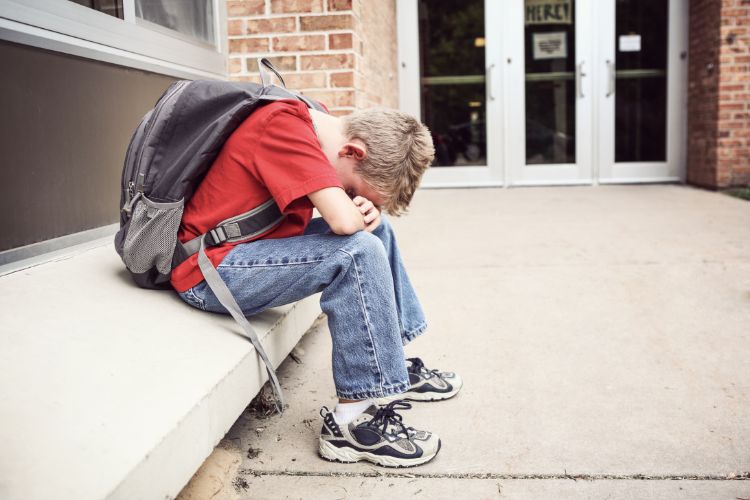Does your child resist school with intense tantrums or unexplained illnesses? Are mornings a battleground, but the symptoms vanish once school is out? If so, you might be facing the complex challenge of Understanding School Refusal. It’s frustrating and worrisome, but you’re not alone!
Let’s uncover what school refusal is, why it happens, and equip you with strategies to help your child overcome this hurdle and get back on track with their education.
What Exactly Is School Refusal?
School refusal occurs when a child becomes deeply distressed about going to school. It’s more than the occasional “I don’t wanna go!” We’re talking about extreme reluctance that can lead to missing significant amounts of school time. Children experiencing school refusal often remain at home with their parents’ knowledge, despite efforts to encourage attendance.
It’s important to note that school refusal isn’t an official psychiatric diagnosis; it’s a descriptive term for a complex emotional issue.
Spotting the School Refusal Signs
If your child resists going to school, it’s natural to feel caught in a battle of wills. Keep in mind that school refusal likely stems from deep-rooted anxieties about school itself or other factors. Here’s what to watch for:
- Intense emotional displays: Tantrums, crying, yelling, or even hiding.
- Physical complaints: Headaches, stomach aches, nausea (particularly before school, and improving when staying home).
- Difficulty sleeping: Restlessness or nightmares linked to school worries.
- Extreme clinginess: Refusing to be separated from you.
- Threats of self-harm: These should always be taken seriously.
Important note: School refusal is more common in kids aged 5-6 and 10-11 years, but can occur at any stage of schooling.
Why Does School Refusal Happen?

Unfortunately, there’s rarely one simple answer. Identifying the trigger is key to finding solutions. Look out for these common culprits:
- Anxiety disorders: Separation anxiety, social anxiety, or generalized anxiety can be overwhelming.
- Specific phobias: Fear of tests, certain teachers, school bathrooms, etc.
- Bullying: Being targeted by peers can make school a terrifying place.
- Learning difficulties: Undiagnosed difficulties make school frustrating and demoralizing.
- Social challenges: Feeling isolated or having conflicts with friends.
- Depression: Can make it hard to find the motivation for anything, including school.
- Changes at home: Family moves, illness, divorce, or loss can trigger anxieties.
Sometimes, starting or changing schools can lead to temporary nervousness. But with school refusal, the distress persists.
Is it Just Avoiding the Unpleasant?
It’s easy to wonder if a child is simply manipulating to get out of schoolwork. But by avoiding school, they might be trying to escape intense anxiety or other overwhelming feelings. It’s vital not to dismiss their emotions as “faking it.”
Understanding Your Child’s Experience
So, you’ve identified some signs of school refusal, and you’re starting to understand the potential causes. The next step is to develop a deeper understanding of your child’s perspective. This will be critical in working together to address the underlying issue and get them back on track at school.
Here are some ways to bridge the gap:
- Open Communication is Key: Talk openly with your child in a calm and supportive environment. Ask open-ended questions like, “What’s the hardest part about school for you?” or “Is there anything specific you’re worried about?” Actively listen without judgment and validate their feelings.
- Identify Triggers: Work with your child to pinpoint what specifically triggers their school refusal. Is it a certain class, teacher, or social situation?
- Consider the Bigger Picture: Reflect on recent events or changes at home that could be contributing to their anxiety.
- Identify Triggers: Work with your child to pinpoint what specifically triggers their school refusal. Is it a certain class, teacher, or social situation?
- Consider the Bigger Picture: Reflect on recent events or changes at home that could be contributing to their anxiety.
Helpful Hint:
Sometimes, younger children might find it easier to express themselves through play or art. Let them draw or create a story to help them communicate their anxieties.
Here’s an example: Let’s say your child expresses fear about a new math teacher. Digging deeper, you discover they had a difficult experience with a strict math teacher in the past. Suddenly, their current anxieties make perfect sense.
By uncovering these triggers, you can start formulating solutions tailored to your child’s specific needs.
Finding Solutions: A Collaborative Approach

Once you understand the root cause of your child’s school refusal, you can begin crafting a plan to get them back in the classroom. Remember, this is a collaborative effort – you, your child, their teachers, and potentially, a mental health professional will all play a part.
Here are some strategies to explore:
- Addressing Underlying Issues: If anxiety, depression, or learning difficulties are at play, seeking professional help is crucial. Therapists can equip your child with coping mechanisms and build their emotional resilience.
- Working with the School: Communicate openly with your child’s teachers and school counselor. Explain the challenges your child is facing and work together to develop a support plan at school. This might involve modifications, classroom accommodations, or check-ins with a trusted adult.
- Building Confidence: Help your child develop coping mechanisms for managing anxiety. Relaxation techniques like deep breathing or mindfulness exercises can be incredibly helpful. Role-playing potential social situations at school can also build confidence.
- Positive Reinforcement: Acknowledge and celebrate even small steps towards overcoming their fear. Positive reinforcement strengthens desired behaviors, motivating them to keep trying.
- Addressing Bullying: If bullying is a factor, the school administration needs to be involved immediately. They have a responsibility to ensure a safe and inclusive learning environment.
- Gradual Re-entry: Depending on the severity of the situation, a gradual return to school might be necessary. Starting with shorter days or attending specific classes they’re comfortable with can help ease them back in.
Remember: There’s no one-size-fits-all solution. Finding the right approach will take patience, empathy, and collaboration. Don’t get discouraged by setbacks – celebrate progress, no matter how small.
Creating a Supportive Home Environment

Your home should be a safe haven for your child as they grapple with school refusal. Here are some ways to create a supportive environment:
- Maintain a Consistent Routine: Having a predictable routine, even on non-school days, can provide a sense of security and normalcy.
- Open Communication Channels: Keep the lines of communication open. Encourage your child to share their worries and anxieties freely.
- Validate Their Feelings: Let them know their feelings are valid. Don’t dismiss their anxieties or pressure them to “just get over it.”
- Focus on the Positive: Acknowledge and celebrate even small victories, like getting dressed for school or completing an assignment at home.
- Stick to Expectations: While you want to be supportive, don’t enable avoidance behaviors. Set clear expectations about responsibilities at home, even if they’re not attending school full-time.
- Address Underlying Issues: If anxiety, depression, or learning difficulties are contributing factors, getting professional help is crucial.
Remember: You can’t force your child to want to go to school. But you can create a loving and supportive environment that fosters open communication and helps them manage their anxieties.
Taking Care of Yourself: Self-Care for Parents
School refusal can take a toll on parents as well. Here are some tips for managing your own well-being:
- Seek Support: Don’t be afraid to reach out to your partner, family members, or friends for support. Talking to other parents who have been through similar situations can be incredibly helpful.
- Educate Yourself: The more you understand about school refusal, the better equipped you’ll be to help your child.
- Set Boundaries: It’s important to set boundaries and take time for yourself. This will help you avoid burnout and be a more effective source of support for your child.
- Practice Self-Care: Make time for activities that help you manage stress and relax, whether it’s exercise, spending time in nature, or pursuing hobbies you enjoy.
- Don’t Blame Yourself: School refusal can stem from a variety of factors, many of which are outside your control. Don’t beat yourself up – focus on solutions, not blame.
Remember, you’re not alone in this journey. With patience, understanding, and the right support system in place, you can help your child overcome school refusal and get back on track to a successful academic experience.
FAQs
Absolutely! Consider these helpful resources: The National Association of School Psychologists, The American Academy of Child and Adolescent Psychiatry: aacap.org, and The Jed Foundation: jedfoundation.org.
Wrapping Up
School refusal can feel overwhelming for parents and children alike. Remember, understanding the root cause and seeking appropriate help is crucial. With patience, understanding school refusal, and a collaborative approach, you and your child can overcome this challenge. Your child can re-discover the joy of learning as they regain confidence and a positive school experience.
